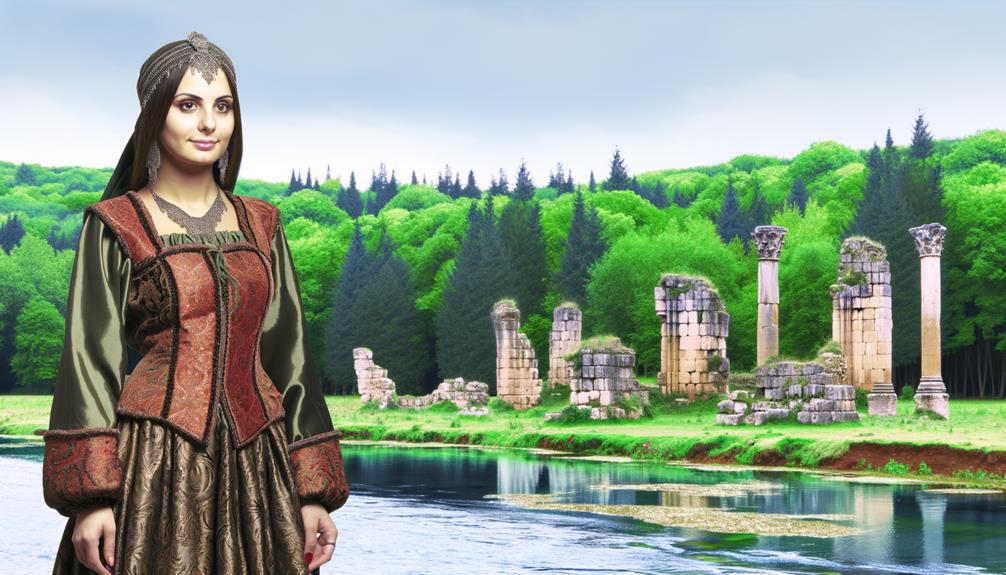Meaning of the Name Isolde
The name Isolde, with roots in Old High German and Celtic languages, combines the elements "īs" (ice) and "hiltja" (battle), denoting strength and resilience. Historically, Isolde gained prominence through the medieval legend of Tristan and Isolde, epitomizing chivalric and romantic ideals.
The name has scholarly significance, appearing in various literary, musical, and artistic works, including Richard Wagner's opera. Despite fluctuations in popularity, Isolde remains a name of cultural resonance, appreciated for its unique sound and rich heritage.
For those interested in exploring the intricate layers that define Isolde, numerous historical and cultural contexts await.

Key Takeaways
- Isolde combines Old High German 'īs' (ice) and 'hiltja' (battle) with the Celtic name Essylt.
- The name signifies strength, allure, fortitude, and resilience.
- Isolde is historically tied to the legend of Tristan and Isolde from Celtic mythology.
- It symbolizes chivalric and romantic ideals from the High Middle Ages.
- Modern usage reflects its romantic and historic connotations, with periodic resurgences in popularity.
Origins and Etymology
The name Isolde originates from Old High German and Celtic roots, signifying a rich intersection of linguistic and cultural influences. The Old High German elements 'īs' meaning 'ice' and 'hiltja' meaning 'battle' converge with the Celtic name Essylt, which translates to 'she who is gazed upon.'
This linguistic amalgamation underscores a blend of strength and allure. The Germanic component emphasizes fortitude and resilience, while the Celtic aspect highlights visibility and prominence. The dual heritage of the name Isolde reflects a nuanced interplay between the harshness of battle and the enchanting presence, offering a multidimensional understanding of its etymology.
Such a composite origin reveals the intricate tapestry of European linguistic traditions and their enduring impact on personal nomenclature.
Historical Context
Frequently intertwined with medieval European lore, the name Isolde garners historical significance due to its prominent association with the legend of Tristan and Isolde.
This legend, stemming from Celtic mythology, made its way into the literary canon of the High Middle Ages through various adaptations in both French and German traditions. Isolde, as a character, exemplifies the chivalric and romantic ideals prevalent during this era.
Historical records suggest that the tale's propagation was closely linked to the cultural exchanges between the Norman, Breton, and Anglo-Saxon societies. The name itself, hence, does not merely represent a character but symbolizes the intricate blend of cultural narratives and values that shaped medieval European identity.
This historical context underscores Isolde's enduring allure in cultural memory.
Literary Connections
Building on its historical roots, the name Isolde finds rich literary connections through its prominent role in various medieval and modern literary works. The most notable reference is the legend of Tristan and Isolde, a cornerstone of Arthurian romance. This tale has been adapted by numerous authors and composers, solidifying Isolde's place in literary history. Richard Wagner's opera "Tristan und Isolde" is a prime example of its cultural resonance.
| Work | Author/Composer |
|---|---|
| "Tristan und Isolde" | Richard Wagner |
| "The Romance of Tristan" | Béroul, Thomas of Britain |
| "Tristan and Iseult" | Joseph Bédier |
These adaptations illustrate the enduring allure of Isolde's narrative, which continues to captivate audiences through its timeless themes of love and tragedy.
Cultural Impact
Isolde's name transcends literature, permeating various facets of culture through its representation in music, art, and modern media adaptations. Its cultural impact is evident in several key areas:
- Music:
Richard Wagner's opera 'Tristan und Isolde' is a seminal work, epitomizing the Romantic era's musical and emotional intensity.
- Art:
Visual depictions of Isolde have been prolific, with artists like Edmund Leighton and Dante Gabriel Rossetti capturing her tragic beauty and complex narrative.
- Media Adaptations:
Isolde's story has been adapted into numerous films and television series, with each rendition bringing fresh interpretations to the timeless legend.
These representations collectively underscore Isolde's enduring legacy, attesting to her powerful influence across diverse cultural domains.
Modern Usage and Popularity
In contemporary times, the name Isolde has seen fluctuating popularity, influenced by cultural revivals and literary reimaginings. The name, rooted in Arthurian legend and immortalized through Wagner's opera 'Tristan und Isolde,' experiences periodic resurgences.
Modern parents occasionally choose it for its romantic and historic connotations, though it remains relatively rare. Data from various name registries suggest a modest increase in usage, particularly in regions with strong ties to Celtic and Germanic heritage.
Additionally, the name's appearance in contemporary literature and media has contributed to its renewed interest. Despite its limited mainstream adoption, Isolde's unique phonetic quality and rich cultural background guarantee it retains a niche appeal among discerning name choosers.
Conclusion
The name Isolde, rooted in historical and literary traditions, reflects a rich tapestry of cultural significance juxtaposed with modern relevance. Its origins and etymology convey an ancient heritage, while its historical and literary connections underscore a timeless allure.
The cultural impact of Isolde resonates through centuries, yet its modern usage and popularity highlight a continued fascination. Consequently, the name Isolde serves as a bridge between past and present, tradition and modernity, antiquity and contemporary life.






